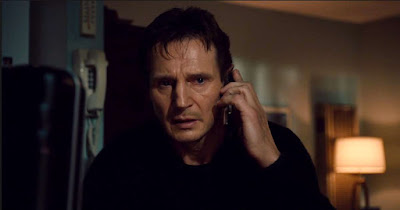"I don't know who you are. I don't know what you want. If you are looking for ransom I can tell you I don't have money, but what I do have are a very particular set of skills. Skills I have acquired over a very long career. Skills that make me a nightmare for people like you. If you let my daughter go now that'll be the end of it. I will not look for you. I will not pursue you. But if you don't, I will look for you, I will find you, and I will kill you.”
Remembered as an ultimate steely action movie threat of promised retribution—a short speech and statement of purpose—it, more than anything else, opened the doors for Neeson’s next fifteen years of action movies. He was immediately able to play dozens of tough old guys who still know how to muster up the ability to kick in some teeth and survive chases and shootouts. But watch the scene again and notice that it also taps into what the best of those pictures find: his sadness. You can see the fear and doubt on his face, the deliberate weighing of words that are as much about talking himself into action as they are scaring the bad guy. He takes one heavy pause, a slow blink, as he steels himself for what he hopes won’t have to come next. He’s tired, but determined. When he asks the villain to “let [his] daughter go now,” you really feel that he hopes that will be the end of it.
It’s because Neeson is so tall, broad-shouldered, and has a voice so paradoxically soft-spoken while in a gravely tenor, that he makes obvious sense as a heavy threat. He speaks softly and carries a big stick, moving with a slow but inexorable gait laden with potential violence. But it’s that sadness in his eyes, the ways his brow and chin draw down with a resting reluctance, that make him so sympathetic, too. In the best thrillers of this stretch of his career, like A Walk Among the Tombstones or The Grey or Non-Stop or Run All Night, he’s played alcoholics, disgraced cops or retiring robbers, suicidal workingmen, grieving fathers, and sullen widowers. (And that this string of melancholy action pictures began shortly after the sudden death of his wife adds an extra layer to the downbeat mood.) In each, the power comes, not merely from the action itself—though it can be quite well done—but from the mournful weight to the violence. You can feel it, because he’s so clearly affected by it. He enters the pictures sad, and the dutiful action unspools cautiously, reluctantly, forcefully. The spectacle adds weariness to his stance, and his slow-speed pursuit of justice. Or is it simply something to numb the pain and stave off the end?
Neeson then re-teamed with Williams for Blacklight, a movie that also has a healthy distrust of law enforcement. In this one, Neeson’s an FBI fixer who is drawn into a larger understanding of a conspiracy to murder a progressive politician. He then has to help stop them before they hurt more people. In the opening scene, an Ocasio-Cortez kinda-sorta lookalike is killed in a hit-and-run, and soon an investigative journalist and a whistleblower are imperiled by nefarious Deep State death squads led by a sneering agent (Aidan Quinn) who casually talks about quashing protestors. (This one squirmingly feels the tenor of the times in spots.) The whole thing’s at once too hyperbolic and too chintzy, full of nearly provocative ideas for which it loses nerve, cavernous nowheres where the plot’s detail and dimension should be, and the Neeson character is almost superfluous to the plot’s mechanics. The picture wants pseudo-70’s paranoid style, but is shot in an overlit textureless digital smear in Melbourne doubling unconvincingly for D.C. I wish its style and substance was as wild as its ambitions. But at least those movies are not as perilously thin as Jonathan Hensleigh’s The Ice Road, in which Neeson’s ice road trucker gets entangled in some shady shenanigans. There’s nothing real or convincing about anything, from character to location to action. And it even has Laurence Fishburne around loaning just part of his natural gravitas to the proceedings!When they can’t make a truck chase across a frozen river exciting, you know the movie’s gone wrong.
It’s starting to feel like the Neeson: Action Star project is just about out of steam. The feeling is all through his latest, Martin Campbell’s Memory. Though it has such a good idea for him to play, that makes it all the more disappointing it’s just another middling thriller built from off-the-shelf parts. (And from a director who successfully rebooted James Bond twice! Alas…) Here Neeson’s a veteran hitman succumbing to Alzheimers. What a frightening prospect! There’s a chilling moment in the middle of the picture where the guy’s refused to follow through on an assassination of a 13-year-old girl. That night, he has a nightmare in which he kills her. The next morning, her death is reported on the news. Wait, he thinks, did I? Or didn’t I? The movie plays on the terrible ambiguity, but only for a moment. Turns out he didn’t, so he spends the rest of the movie fighting his slipping mind as a supporting character to the larger investigation carried out by a detective played by a stringy-haired, slumped-shouldered Guy Pearce. The sheer tonnage of routine shoe-leather and rote shootings weigh down the potentially clever ideas at its center, and bury the actors—even Monica Bellucci as a dastardly real estate mogul—in a blandly developed conspiracy that’s too-easily unraveled for us in the audience. Once that’s sorted, then it’s just a glum matter of hoping the characters can figure it out in time.
As thrillers of this ilk have been diminishing returns for Neeson, his most satisfying movie of the past few years is a straight drama: Ordinary Love. The story it tells is ordinary, and it is tender plain-spoken simplicity that gives it power. Here’s a movie about an aging couple (Neeson paired with Lesley Manville). They’re comfortable with each other, so much that even their slight tensions and disagreements can be shrugged off. They go for walks. They grocery shop. They watch TV. They trade chores. There’s an unspoken absence. The mantle photos show a daughter they don’t mention for quite a while. You get the sense she’s dead before they ever make reference to her grave. Like any couple of this sort, they’ve accumulated quite the history, and it sits unspoken on their shoulders, weighing in on every exchange. This makes a fatal diagnosis a cruel puncture to their clearly hard-won comfort. The movie follows matter-of-factly the aftermath of this diagnosis as a course of treatment is decided upon and inevitable emotional and interpersonal struggles arrive from heavy potential outcomes hanging over their heads. The screenplay from playwright Owen McCafferty gives these actors space to explore the ideas inherent in this situation, with Manville providing such a heartrending quivering in her stiff upper lip, and Neeson’s facility with grief and sadness is refined in a film of pinprick specificity. Somehow he’s looped back around to this sort of picture being the refreshing change of pace. How satisfying to see a picture so small, so plain, and yet carrying a lifetime of feeling.





